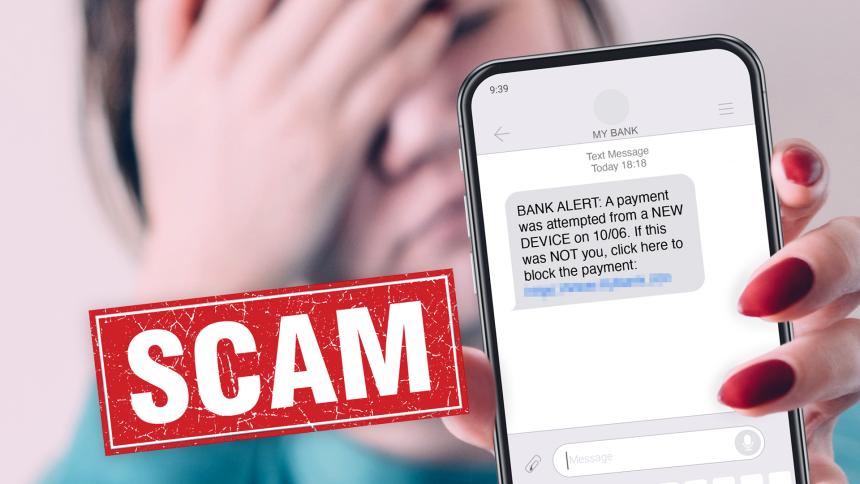
How to avoid mobile phone and text scams
Scams perpetuated by phone calls and texts have become a global scourge. According to data collected by the regulator Ofcom, more than 40 million people in the UK received suspicious calls or texts in the space of just three months in 2022.
What’s worse is that scammers have become increasingly sophisticated in their approach, from impersonating people’s loved ones in a terrifyingly convincing way to hijacking existing text chats. Here are the techniques you should be most aware of.
AI imposter fraud
In one of the most insidious and disturbing developments in the history of mobile phone fraud, scammers have now started using AI voice generators to mimic the voices of real human beings. Specifically, the loved ones of their intended victims.
A recent news report highlighted the story of 73-year-old Canadian woman Ruth Card, who panicked when her grandson Brandon rang her up to say he was in jail and needed money for bail. Ruth was poised to send him thousands of dollars when her bank manager intervened to say it had all the hallmarks of a new scam, and that the voice she’d heard on the phone wasn’t Brandon’s at all. It had been digitally fabricated.
In another, even more outrageous Canadian example, the parents of a man named Benjamin Perkin ended up sending $21,000 to a scammer who’d cloned Perkin’s voice and claimed he’d been arrested for killing a US diplomat in a car accident. As Perkin later said in a press interview, his voice was ‘close enough for my parents to truly believe they did speak with me.’ He believes his voice may have been lifted from a YouTube video he’d posted about snowmobiling.
We need to now be more vigilant than ever before, and if someone sounding like your loved one rings you out of the blue asking for money, always verify that it really is them.
Upgrade scams
Being conned into paying for goods and services that don’t exist is an age-old phenomenon. But criminals have now come up with a diabolically ingenious twist on the formula: they leverage their victims to steal expensive handsets before vanishing into thin air.
According to the UK’s National Fraud Intelligence Bureau, this is an upgrade scam, and it begins with the target being cold-called by someone purporting to work at a legitimate mobile network operator.
The target is offered a handset upgrade at a big discount and persuaded to hand over their mobile and bank account details. The scammer then places an order for a handset from the real mobile network on behalf of the target. However, it’s not the same handset discussed in the original call. When it arrives and the target contacts the scammer to complain, they’re reassured that it’s a simple error, and instructed to return the handset to a certain address.
Once they receive the handset, the scammer abruptly cuts off contact. The target is then left without a handset, plus a new contract in their name. It may sound like a bizarre and unlikely scheme, but the National Fraud Intelligence Bureau says that hundreds of people have fallen victim to this scam since 2020.
The ‘Can you hear me?’ scam
Many of us have answered calls from unknown numbers, only to hear a crackly, far-away voice telling us that we’re entitled to compensation from a car accident, or some other made-up event. But a sinister variation on this classic mobile con reportedly emerged in 2017, when reports began to circulate of scammers ringing up targets, claiming to be from a legitimate company and then asking, ‘Can you hear me?’
The objective is to record your use of the word ‘Yes’, and then use that sample to make purchases in your name or authorise changes to your credit card accounts. Speaking to Reader’s Digest about it, cybersecurity expert Matthew Shirley highlighted, ‘this phone scam is particularly frightening because they simply rely on the human behaviour of answering a quick question.'
While there has been some debate about just how widespread the ‘Can you hear me scam?’ really is, it’s yet another reminder to always be very careful about what you say to strangers on the phone.
Text infiltration
In 2023, news broke of yet another mobile scam doing the rounds. A member of the public contacted the consumer group Which? to report that he’d received a suspicious text asking him to confirm his Lloyds Bank details. The message claimed that someone was trying to pay for an Amazon order using his account.
Of course, scam texts are nothing new. But what made this incident so striking was the fact that the text appeared within an existing chain of legitimate Lloyds Bank messages. Scammers can hijack threads by exploiting a loophole in phone software, which causes operating systems to group SMS messages by their short names. So, in this target’s case, fake texts sent under the short name ‘Lloyds Bank’ were automatically sorted into the existing Lloyds Bank message chain.
In the words of Which? senior researcher Faye Lipson, ‘It’s common for scammers to have some prior knowledge of us – such as where we bank – gleaned from data breaches and then traded on murkier sections of the internet, and the vast majority of us will have had our data stolen at some point.’
This means any message received by text, no matter how convincing, must be treated with caution, especially if they request personal details of any kind. If in doubt, call the bank yourself.








